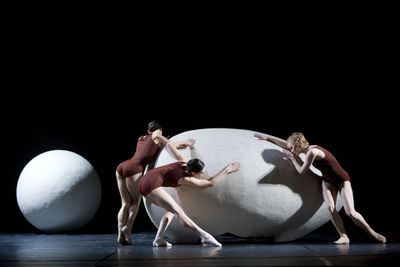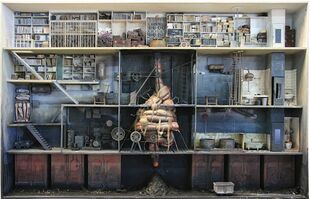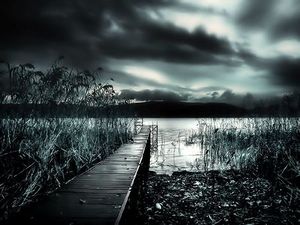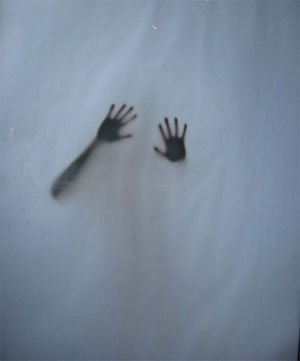Norf-Zorg (opera)

Norf-Zorg is an opera composed by the darkest forces of the cosmos. It is famous for its baffling nature and particularly high death toll during its six short productions. It is scored for a gigantic orchestra (including falling anvils) written in ancient Hittite cuneiform. Traditionally divided into three acts, it is a monumental work, expensive to produce and deadly for the cast, production crew and audience.
This opera should not be confused with the Elizabethan morality play Norf-Zorg which is an unrelated work about the 15th-century quest to find Jesus' foreskin. The first time the play was produced, an actor hiccupped on stage and the audience laughed in a merry diversion. The first time Norf-Zog the opera was produced it resulted in the saddest bloodbath in opera history.
The most recent performance at the Comic Opera theatre in Berlin saw an augmented orchestra with seven hundred auxiliary musicians flown in from as far as Easter Island. The opera house requested permission to build three additional levels on the roof to accommodate the cathedral-sized stage. The mayor refused and even threatened to shut down the whole project. That night he was told in a dream that if he didn't change his mind his children would all grow up to be social media influencers. The permit was signed the next day. The performance won rave reviews; however, no one who had seen the production is alive today.
History
The score was discovered by illiterate peasants who coincidentally stopped breathing a few days after touching the strange unidentifiable material it was written on. They passed it on to their local lord who gave it as a birthday present to his cousin the Hapsburg emperor (now known as one of the most ill fated gifts ever given). The peasants found the score inside a canister made of a metal that seemed to be buzzing if you put it up to your ear. The score's paper was made of a strange material with a strongly iridescent quality to it as its ink could be read in the dark.
The score was inspected by court composer Joseph Haydn, who felt terribly ill while reviewing the musical lines. He found the subject of Norf-Zorg overly absurd and couldn't follow the physics-defying rhythms through bloody eyes. He didn't believe that an 850-piece orchestra was practical and assumed it was all a stupid practical joke by his annoying friend W. A. Mozart. Mozart denied this was the case and read the score stealing several music ideas for his upcoming operas (his first successes). Neither Haydn nor Mozart participated in the production of Norf-Zorg as they were both bedridden by a mysterious illness for weeks after they read the score (of which Mozart had never seemed to recover).
Various ancient stories suggest that this opera was once performed on Easter Island well before its premiere in Vienna. Confirmation of this legend is impossible as the flights to Easter Island involve too many stop-overs and are kind of expensive. However there is an uncanny resemblance between the island's statues with open gaping mouths and the second most evil character of the opera.
Libretto
The original libretto has been lost to time, as all books with a summary of the opera plot have been checked out of all libraries which they were housed in and have not yet been returned. Paintings which depict rehearsals of Norf-Zorg show various characters wearing incandescent clothes and strange metallic spikes sticking out of their skin. Thus, the original story cannot be summarized as nothing else is known about it, though it can be safely assumed that the story was of a fantastic nature which involved endless confusion and cruelty.
Overture
It is written in the sinister 13/13 time with a key signature that has both sharps and flats which makes it technically unplayable by Earthly instruments. Musicians note that when the score is played, the notes seem to leap off of the page and swirl in spiral patterns corresponding to the number of deaths caused by the Opera so far (as of 29 Feb 2021, 13,159 people, two dogs and one unidentified humanoid).
The overture is somewhat lengthy at just over two hours and doesn't have a clear ending – the first aria begins with a soprano's screaming a high C, waking up the nearly comatose audience. There are no section divisions nor indication of when one act begins or ends leaving it up to the stage-director to decide. Most opera houses decided to end the first act after three hours so that the orchestra and singers can drink some water and take a crap before their potential demise.
There are no page numbers or tempo markings on the score meaning if the pages were randomly scattered there would be no way to put them back in order. This almost certainly happened at some point as the entire work seems both random and orderless. The principle oboe player in the infamous third performance in Wurms, Germany, wrote (before his death from a falling piano) that each time he made a mistake during practice he felt like some invisible force had whacked him on the head. Playing around he made a few errors on purpose and his house started shaking. After playing an entire page in the wrong key, his wife announced she was leaving him to marry a douchey social media influencer. After playing the music correctly she changed her mind and immediately gave him the best blow job an oboist could ever hope for.

Act I
Dubbed as the clusterfuck act. The harpsichord base notes in the recitatives are made of chords with exponent numbers, suggesting that a four-dimensional harpsichord is needed. This begs the question whether the composer(s) came from a higher reality than 18th-century Vienna.
Act II
A back up singer in the 18th century wrote about the injuries she suffered during rehearsals in her journal before her death in an implosion at the Vienna Court Opera. Over the several weeks of rehearsals her diary becomes less coherent to the point she is rambling babble nonsense written in cuneiform. At some point the text in her diary is censored by thick black marker with an ink analysis dating to the year 1880 which is odd as the marker was a 20th-century invention.
The audience at the 18th-century Viennese premiere did not know how to react when a character named Stalin died of some disease called COVID-19. They didn't know if that was frightening or a good thing. The rest of the act is similarly incomprehensible, involving an antihero who is both a villain and an innocent bystander. The antihero saves the innocent bystander (himself) from a grandfather clock-related disaster of his own making. This scene was somehow the inspiration for the secret 13 herbs and spices recipe for Kentucky Fried Chicken.

Act III
All known disasters related to Norf-Zorg occur in the third act as performers and audiences either die an ironic death or just disappear. One performance was halted due to the spontaneous outbreak of war throughout Europe with the opera house raided by Sumatran cannibals, which is strange as Indonesian tribes people stopped eating humans by the 17th century. All that is known about the plot are the helmeted female warriors on flying horses who successfully develop careers as social media influencers to the utter outrage of their God-like father who punishes them by setting the entire internet on fire.
Performances
The premiere was considered the biggest fracases in operatic history. The opera house collapsed and erupted into a green fire which burnt for two weeks despite all attempts by firefighters to put it out. The only survivor was an audience member who left the theatre after ten minutes complaining about a sensation of existential dread. He was admitted to an insane asylum where he spent his days talking to the walls in ancient Hittite.
The most recent performance, at the Comic Opera in Berlin in 2010, was considered a stunning success. News sources list the opera as a triumph of the imagination. All newspaper reviews seem to have been scrubbed of content except a few mobile phone images that linger on Twitter. One shows spherical balls of volatile plasma which seem to hover throughout the opera house and waterfalls which consist of a silvery liquid which flow up instead of downwards. The other images are incomprehensible. Clearly part of the joy of seeing the opera is the chance to understand what the shit is going on and the thrill of wondering if you will live to see the next day.
Criticism
The opera has received universal praise and no criticism, much like The Golden Girls.
Legacy
No scores, librettos nor any other material nor copies of it can be found for future productions of Norf-Zorg which makes further performances of it rather difficult. Stories of the score, suddenly appearing on the desks of opera managers in shiny metallic like cylinders are numerous and it is expected that this may happen again in the near future. Norf-Zorg scholars are eagerly anticipating the next appearance of the music and its performance, undeterred by the seemingly large amount of bad luck that opera houses have with the opera. While the performance of Macbeth is known to be somewhat plagued by interrupted performances and actors breaking their legs, Norf-Zorg has been associated with accidental death and mass disappearances. In any case, Teatro alla Scala in Milan, Italy, has left a slot open in its next season in case the score magically materialises out of thin air. Their insurance agency has warned them that they will have to raise their premiums ten thousand fold if they attempt a performance of the opera. Advance tickets were sold out within minutes to those who enjoy old European culture and absurdist theatre – and have suicidal tendencies.
See also
- Hochkonjunktur, bumste ich sie verlobtes, ich hatte geschlecht mit Ihrem man
- Star Wars (Japanese opera)



